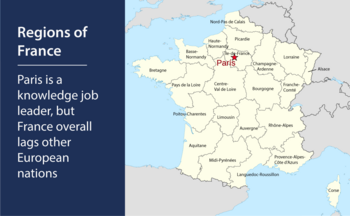
Paris hosts some of the world´s leading technology companies, has several of the leading technological universities and is the European region with highest total number of knowledge intensive jobs. France as a country however lags as a knowledge economy, with limited progress outside the capital region.
Together with London and Zurich, Paris is one of the three European cities which has the highest concentration of world´s 500 leading deep tech companies. It is strong in the areas of photonics, clean energy, biotechnology and quantum computing.
Those regions which tend to have a high share of world leading technology firms, are usually also where some of the highest-ranking technological universities of the world are found. France hosts four out of the world´s QS World University Rankings top 100 leading institutes in engineering and technology. These are Institute Polytechnique de Paris, Université Paris-Saclay, Université PSL and Sorbonne University.
The common theme of the four leading universities is that they are all found in the French capital region. Likewise, while some of the leading technological companies of France are found outside Paris, in Rennes and Lille, most are focused to the capital region.
In Paris 14.4 percent of the adult population is employed in brain business jobs, a term for employment in knowledge-intensive firms in tech, information and communications technology, advanced services, and creative professions. This is not quite as high as leaders Bratislava and Prague that have 24.5 and 23.8 percent of their adults in brain business jobs, but is still one of the highest levels in Europe. However, in total numbers Bratislava only has 107,600 brain business jobs, while Prague has 190,300. Paris is the only European region with more than one million adults employed in highly knowledge intensive jobs. There are nearly twice as many brain business jobs in total in Paris than in Madrid.
| Ranking and Total Number Brain Business Jobs | ||
| 1 | Paris | 1,066,200 |
| 2 | Madrid | 586,000 |
| 3 | Lombardia | 550,000 |
| 4 | Oberbayern | 453,200 |
| 5 | Cataluña | 365,800 |
| 6 | Warsaw | 344,900 |
| 7 | Berlin | 343,600 |
| 8 | Darmstadt | 297,900 |
| 9 | Bucharest | 284,200 | 10 | Dublin | 280,700 |
(Note: UK and thus London not included, stopped publishing data following Brexit. Previously when data for London was published, the city has somewhat fewer total brain business jobs than what Paris did).
As a country, France however lags behind in knowledge. In Switzerland 1.56 of the world’s leading 500 deep tech companies exist per million adults. The same share is 0.79 in the Netherlands and the UK, 0.61 in Sweden, and 0.58 in Ireland. In France there are merely 0.17 world leading deep tech 500 companies per million adults, above Spain (0.13) and twice that of Italy (0.08) but not amongst the European top.
In total 6.4 percent of the adult population in France is employed in highly knowledge intensive jobs. This is quite far from the leaders Switzerland and Ireland (11.2 percent) as well as Sweden (10.3 percent).
Even in Southern Europe, Malta (9.4 percent) and Cyprus (9.0) percent have a significant lead in knowledge intensity to France. Portugal (7.8 percent) likewise has a significantly higher share of its population in knowledge intensive jobs.
Paris has a strong performance, since it combines a very large size with relatively high knowledge density. Yet France as a whole has limited knowledge intensive jobs, world leading technology companies and world leading universities in technology and mathematics outside of the capital region.
France has strong opportunities to be Europe’s leading knowledge intensive hub, but high taxes and correspondingly high government expenditure are crowding out private sector growth. Strengthening education and implementing more favorable taxation and business policy, is needed for France as a whole to grow as a knowledge intensive region. For Paris itself, a challenge is to boost growth of new housing, since if growing knowledge intensive companies find it difficult to find housing for their staff, it gives them another reason on top of taxation and regulation to locate to a competing knowledge intensive region, such as the capital regions of Central European nations.
| Brain Business Jobs per Capita, Paris and Other Cities in France | |||
| Brain business jobs per capita | Brain business jobs per capita | ||
| Paris | 14.4% | Auvergne | 3.4% |
| Rhône-Alpes | 6.8% | Basse-Normandie | 3.0% |
| Midi-Pyrénées | 6.6% | Franche-Comté | 2.6% |
| Provence-Alpes-Côte d’Azur | 5.2% | Poitou-Charentes | 2.5% |
| Pays de la Loire | 5.1% | Bourgogne | 2.4% |
| Aquitaine | 4.9% | Lorraine | 2.3% |
| Bretagne | 4.5% | Champagne-Ardenne | 2.3% |
| Alsace | 4.5% | Limousin | 2.3% |
| Nord-Pas de Calais | 4.0% | Picardie | 2.2% |
| Haute-Normandie | 3.7% | Corse | 2.1% |
| Languedoc-Roussillon | 3.7% | ||
Author: Nima Sanandaji, Director European Centre for Entrepreneurship and Policy Reform.
Chart: adapted from public domain map












